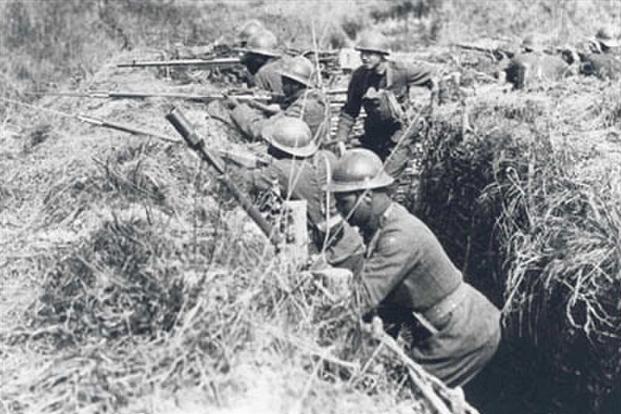World War I experts, professors and students are carefully reviewing century-old military records to determine whether systemic racism cost combat heroes the valor awards they earned.
Historians at Park University, a private school in Parkville, Missouri, are leading the effort to find out whether any of the roughly 40,000 black troops who fought in combat during World War I were wrongfully denied the Medal of Honor. They announced the project details in Washington, D.C., on Monday during the annual Association of the U.S. Army conference.
The Medal of Honor was the only valor award presented to men who fought in World War I. Lower-level awards were created later, but there's never been a comprehensive review looking at why no black troops who fought during WWI were awarded the medal during that time period, said Dwight Mears, a historian and former West Point history professor.
"The criteria at the time were race neutral, but no African-Americans were recognized contemporaneous with the war with the Medal of Honor," he said. "That was almost certainly a result of their ethnicity."
This review, which they hope gets the backing of Pentagon and congressional leaders, seeks to remedy that, Mears added. The project has support from the American Legion and Veterans of Foreign Wars, said Chris Isleib, a spokesman for the U.S. World War I Centennial Commission, and the group has briefed the Congressional Black Caucus on the project.
Poring through 100-year-old military, archival, newspaper and genealogical records will be no easy feat, said Timothy Westcott, director of Park University's George S. Robb Centre for the Study of the Great War. But the hope is that it will lead them to living descendants of some of the troops who showed extraordinary heroism on the battlefield.
Many military records in question were likely destroyed during the 1970s when a fire that burned out of control for 22 hours essentially erased the records of millions of troops who'd been discharged between 1912 and 1964. But looking through other records from the same time period can yield big finds.
That's how Jeffrey Sammons, a history professor at New York University and co-author of "Harlem's Rattlers and the Great War," discovered that William A. Butler, a sergeant from Maryland who served with the all-black 369th Infantry Regiment, had been nominated for the Medal of Honor.
Sammons was preparing for a lecture on George S. Robb, a World War I officer who received the nation's highest valor award, when he found records showing Butler had on the same day been nominated for the Medal of Honor.
"Even more is that George Robb had written a glowing treatment of William Butler's exploits, in which he saved his commanding officer, 1st Lt. Gorman Jones, and a number of men from being captured by the Germans, who had actually infiltrated their trench," Sammons said.
Robb would later receive the Medal of Honor for which he was nominated. Butler did not.
That case prompted Westcott, Mears and Sammons to want to broaden their review so they could find other examples of cases in which men like Butler had been denied the Medal of Honor, likely based on race.
Two black WWI veterans have been posthumously awarded the Medal of Honor. Freddie Stowers, a corporal killed while serving in a unit under French command, was awarded the medal by President George H.W. Bush in 1991. Henry Johnson, who served with what would become the 369th Infantry Regiment, was recognized for his valor by President Barack Obama in 2015.
But a much more thorough, unbiased, comprehensive and systematic review of valor medals, especially the Medal of Honor, for African-American troops is necessary, Sammons said. Park University students have already begun work on the project, which is also likely to uncover instances of other minority groups not getting the recognition they deserved on the battlefield, Westcott said.
"Our initial group will be African-Americans because the segregation of the units is fully documented," he said. "But there will be other groups we will look at ... likely including Hispanic Americans, Native Americans, Jewish Americans and Asian Americans."
-- Gina Harkins can be reached at gina.harkins@military.com. Follow her on Twitter at @ginaaharkins.













